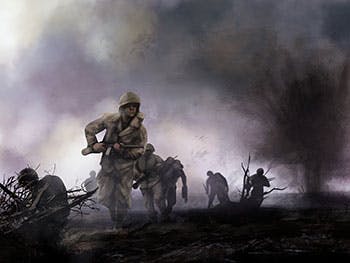EXPERT COMMENT LAST UPDATED : 08 NOVEMBER 2018

Dr Lily Hamourtziadou, lecturer in Criminology at Birmingham City University, says the red poppy may remind us of soldiers killed but doesn’t remind us of war.
Cemeteries are strange places. Many avoid them as eerie, or spooky, or simply too sad for reminding us of our mortality, while others spend years of their lives bent over a tombstone bearing the name of a loved one.
Each grave contains a death and bears witness to a life. The remains of the dead: their physical remains and what remains of their identity. Those who knew them will remember them and even those who did not know them will come to know something about who they were: their names, affiliations, images. In the course of their lives, people may change their name to mark a change in identity or in line with local and traditional norms. Our names are at the core of who we are and of who we are perceived to be by others. When we die, we leave behind something of ourselves through our name, through the recollection of all that name enclosed.
Nations have always commemorated their dead by making lists of those who gave their lives, or lost their lives, as members of that nation, and by building war memorials, to honour those who have died. To remember and honour the dead is important for nations, for states and for families all over the world. It is important for each individual too, for we all want to be remembered, we all want our death to be a loss to someone, just as much as we want our lives to have mattered.
The British military has ensured those British soldiers who gave their lives in Iraq are not forgotten. A list of the 179 soldiers who died there can be found easily: Names, titles, the manner of their death, their images… some smiling, others serious, some holding a child that will have to grow up without their dad or mum. The remembrance poppy has been used since 1921 to commemorate military personnel who have died in war:
In Flanders fields the poppies blow
Between the crosses , row on row,
That mark our place…
As all nations, the British remember their dead soldiers, those young people who ‘gave their lives’ for Britain, ‘for our freedom’. And war becomes equated with military heroism, military sacrifice and military loss. What we don’t commemorate is other losses, no less significant, no less devastating. In Iraq, war has meant that over 200,000 civilians have so far lost their lives, with more dying every day, 15 years after the invasion. A great number of them have not even been identified…
Whose children were they? Whose parents? How many miss them? What did they like to do? What kind of people were they? Did they have a talent? Were they someone’s beloved?
The Holocaust Memorial to the murdered Jews of Europe, in Berlin, is not a war memorial. It honours the memory of civilians killed and serves as a reminder of what can be lost by adopting an ideology that is anti-semitic, racist, fundamentalist, or nationalistic. Yet the emphasis is on the genocide as a result of a destructive ideology, not on war. The Holocaust Memorial is neither called nor regarded as a war memorial.
But it should be.
Because war is not just armies, soldiers, weapons and heroism shown in battle. War is the thousands of civilians killed, those vulnerable populations that are protected by international law, children as well as adults. War is the killing of the unarmed, those people who did not kill anyone. War is hunger and disease, it is orphans begging by the rubble that used to be their home, it is the breakdown of societies, the collapse of states and the anarchy that this brings to the lives of millions of innocents. War is refugees, a generation growing up in refugee camps, it is women violated in Iraq, in Germany, in Bosnia…
‘War memorials’ are really just military memorials. The red poppy may remind us of soldiers killed, but it does not remind us of war, because the fighting of combatants is not all war is.